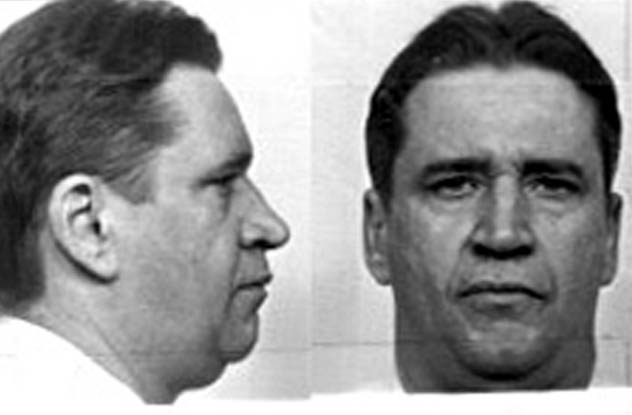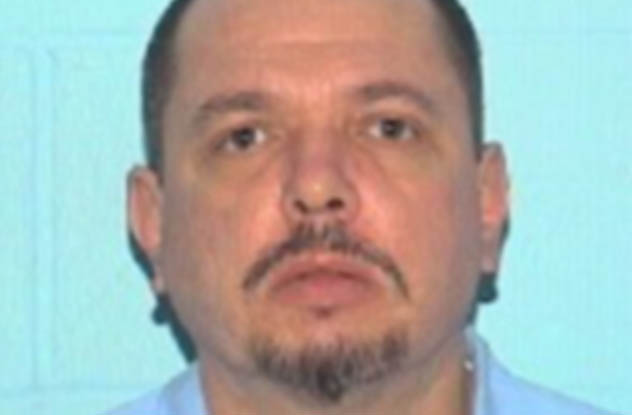 Weird Stuff
Weird Stuff  Weird Stuff
Weird Stuff  Weird Stuff
Weird Stuff The 10 Unluckiest Days from Around the World
 Food
Food 10 Modern Delicacies That Started as Poverty Rations
 Movies and TV
Movies and TV 10 Shared TV Universes You’ve Likely Forgotten About
 Weird Stuff
Weird Stuff 10 of History’s Greatest Pranks & Hoaxes
 Miscellaneous
Miscellaneous 10 LEGO Facts That Will Toy with Your Mind
 Misconceptions
Misconceptions 10 Widespread Historical Myths and the Texts That Started Them
 Crime
Crime 10 Incredible Big-Time Art Fraudsters
 Movies and TV
Movies and TV 10 Most Influential Fictional Objects in Cinema History
 Our World
Our World Top 10 Real Almost‑Cities That Never Materialized
 Weird Stuff
Weird Stuff Ten Bizarre Visions of 2026 from Fiction
 Weird Stuff
Weird Stuff The 10 Unluckiest Days from Around the World
 Food
Food 10 Modern Delicacies That Started as Poverty Rations
Who's Behind Listverse?

Jamie Frater
Head Editor
Jamie founded Listverse due to an insatiable desire to share fascinating, obscure, and bizarre facts. He has been a guest speaker on numerous national radio and television stations and is a five time published author.
More About Us Movies and TV
Movies and TV 10 Shared TV Universes You’ve Likely Forgotten About
 Weird Stuff
Weird Stuff 10 of History’s Greatest Pranks & Hoaxes
 Miscellaneous
Miscellaneous 10 LEGO Facts That Will Toy with Your Mind
 Misconceptions
Misconceptions 10 Widespread Historical Myths and the Texts That Started Them
 Crime
Crime 10 Incredible Big-Time Art Fraudsters
 Movies and TV
Movies and TV 10 Most Influential Fictional Objects in Cinema History
 Our World
Our World Top 10 Real Almost‑Cities That Never Materialized
10 Evil Killers Who Should Have Stayed Behind Bars
Rehabilitation is a great idea. When it works, prison reforms criminals into productive members of society. We’ve even previously cataloged some of these successes.
However, some who commit crimes and get paroled move on to crimes that are even worse. Though just a tiny percentage of murderers and rapists repeat their crimes after being released, those who do seem to do so in the most horrific ways imaginable.
10 Evan Ebel
Evan Ebel was always angry. He was born and raised in a well-to-do family but constantly got into trouble growing up, and many around him thought there was something wrong with him.
At 18, Ebel was arrested for felony armed robbery. He served a year of his three-year sentence and then was arrested again at 20 for felony menacing, robbery and assault. While in prison, he joined the 211 Crew, a Denver white supremacist gang. He assaulted a prison guard and then just kept adding further offenses. He racked up 28 violations in prison and spent the majority of his eight years there in solitary confinement. Yet in January 2013, this violent inmate received an early release, paroled four years before his sentence was up—due to a clerical error.
Within two months, Ebel had managed to slip off his ankle monitor. On March 17, he found and murdered a pizza delivery man. The following day, he drove to the home of Colorado Department of Corrections head Tom Clements, dressed in a pizza delivery uniform. He shot Clements dead as soon as the man opened the door.
Ebel may have acted on the orders from the 211 Crew, but police never heard his explanation. He died in a shootout with them, following a high-speed chase. The alleged 211 hit-list had another name on it: Tim Hand, the parole officer whose error had freed Abel. The disaster overall didn’t end up costing Hand his life, but it did rightly cost him his job.
9 Dwain Lee Little

Dwain Lee Little was 13 when he committed his first murder, killing and raping 16-year-old Oria Fay Fipps. He received a life sentence but was paroled in 1974 after serving the minimum eight years. Perhaps the parole board thought that they couldn’t hold the young man responsible for the brutal crime he’d committed as a boy. But Little’s short time in prison did not reform him, and he left it as violent as ever.
In September of that year, a family disappeared from their campsite in Applegate, Oregon. The following April, authorities found their slain bodies. A cave contained the corpses of mother Belinda, 5-year-old David, and baby Melissa, all with bullet wounds. The father, Richard, had died bound to a tree.
The case remains open to this day, but Little, seen in the area, was the police’s chief suspect. Bullets used in the muders also matched a gun in his possession. Though he was never convicted of this crime, Little did end up serving two life sentences for raping, stabbing, and trying to murder a pregnant hitchhiker in 1979. In jail, he allegedly confessed to the Cowden murders.
8 Andrew Dawson
In 1984, 19-year-old Andrew Dawson from Ormskirk, England broke 91-year-old Henry Walsh’s jaw. He then tied a rope around the old man’s neck and stabbed him 11 times in the chest. His goal in all this was Walsh’s £50 pension book.
Dawson was arrested but received parole in 2000. In July, 2010, Dawson moved into a new apartment complex in Derby. On July 25, 2010 the first body was found.
It was 66-year-old John David Matthews, stabbed 18 times and left in his own bathtub. On July 30, 2010, police found another tenant’s tub with a corpse; this one was 58-year-old Paul Hancock, stabbed 22 times.
Dawson armed himself and ran from the police, hoping to go out in a blaze of glory. Instead, he was tasered, arrested, and given a life sentence.
7 Daniel Joe Hittle

A lot of violent offenders have a problem with rage. Does locking up someone in a cell cure rage?
It certainly didn’t cure Daniel Joe Hittle. When Hittle was 23, he stabbed his adoptive parents to death on April 4, 1973 at their home in Staples, Minnesota. The reason? Their dog scratched his car. He received a 30-year sentence but was released in 1984.
Upon parole, he got permission to move to Garland, Texas. On November 15, 1989, after getting in an argument with his wife, Little sped off in his pickup before being pulled over by police officer Gerald Walker. He fired at Walker’s chest at point blank range with his shotgun.
He then went to the home of his drug dealer, Mary Gross. He and Gross had been feuding—he’d slashed her tires, she’d called the police on him—so he shot her dead. He then moved on to the building’s other occupants. He killed 36-year-old Richard Cook and then 19-year-old Raymond Gregg. When he came to Gross’s daughter, 4-year-old Christy, he stopped. And reloaded. And then shot her, before returning to his truck.
Hittle was arrested and convicted. He was executed by lethal injection on December 6, 2000.
6 Ian McLoughlin
In October 1984, McLoughlin was convicted for killing 49-year-old Len Delgatty. The two had fought, Ian beat him with a hammer, and he got 10 years in prison for manslaughter. Upon release in July 1995, McLoughlin stabbed 56-year-old barman Peter Halls in the neck. This time Ian got a life sentence, eligible for parole in 25 years.
On July 12, 2013, Ian was on day-release preparing for his parole. He went to the home of 86-year-old Francis Cory-Wright, who’d served time in prison with him for child molestation. He tried to rob the old man but found himself facing both Francis and his neighbor, 66-year-old Graham Buck. Ian solved this problem by dragging Buck into the kitchen and stabbing him in the neck till he died.
McLoughlin fled the murder scene but was arrested a short time later. He received another life sentence, and he’ll be eligible for parole again . . . when he’s 95.
5 Timothy Buss

Here’s another shocking case of a boy arrested at 13 and paroled as an adult only to return to his murderous ways.
On May 21, 1980, 5-year-old Tara Sue Huffman went missing in Bradley, Illinois. Young Timothy Buss joined in the search for her, and he found her body in a vacant lot. He’d found her so easily because he was the one who’d killed her. He’d sexually assaulted her, beaten her to death (probably with a whip), and then carted her in a wagon to the dump.
Timothy was tried as an adult and received a 25-year sentence. In 1993, he was released on parole at the age of 26. Sadly, Buss couldn’t shake old urges and on August 7, 1995, 10-year-old Christopher Meyer went missing. A week later, his body was found.
Buss had killed and sexually mutilated Meyer. He’d stabbed him 52 times.
Buss was arrested, convicted and given the death penalty.
4 Jack Unterweger
In 1974, Austrian Jack Unterweger was charged with murder after strangling a victim with her own bra. But in prison, he seemed to turn his life around. He wrote poetry. He wrote an autobiography. He wrote children’s books. Prominent members of Vienna’s intellectual community thought Jack a talented author, and they blamed poor upbringing for his crimes—his absent father had been an unknown American soldier, and his mother had likely been a prostitute. They even lobbied to get him released early from prison, and though the prison denied these requests, they did let him go as soon as parole became possible.
Upon his release in 1990, Unterweger became a minor celebrity. His children’s stories became radio plays. His autobiography, Fegefeur (“Purgatory”) became a bestseller and was made into a movie.
Then the dead prostitutes started popping up. The murders happened in different cities—several in Austrian towns, one in Prague—and in each case, Jack was there. And in each case, the victim was strangled with her own underwear. Police suspected Unterweger, but though they tailed him, they found no solid evidence. Meanwhile, victims kept turning up, till the body count reached eight.
In 1991, a magazine hired Jack for a story comparing European and American attitudes toward sex workers. They sent him to Los Angeles, and during his five months in L.A., three prostitutes were found beaten and then strangled to death with their bras. Working with Austrian authorities, the FBI arrested Unterweger and extradited him back to Austria.
There, Jack put his strangulation skills to use one last time. On June 29, 1994, he hanged himself with his shoelaces in his cell.
3 Kenneth McDuff
Death penalty opponents argue that we can rarely prove guilt with certainty, and even confirmed killers can be reformed. Death penalty advocates respond simply by pointing to Kenneth McDuff.
McDuff was first arrested for burglary and was sentenced to 12 concurrent four-year sentences in 1964. He received parole after a single year. Then in August 1966, McDuff and two friends stopped a car with three teenagers in Fort Worth, Texas. They ordered the two young male passengers into the trunk and fired into it, killing them both. Next, they repeatedly raped the third teen, 16-year-old Edna Louise Sullivan, before strangling her with a broomstick. Then they headed to a gas station to buy some Coca-Cola.
McDuff got three death sentences and walked to the electric chair on two different occasions, but he received a last-minute stay each time. His sentence was later commuted to life, and due to over-crowding, the state paroled him in October 1989.
Three days after getting out of prison, McDuff murdered 31-year-old Sarafia Parker. He wound up back in prison, of course. But then, the very next year, McDuff was paroled yet again.
And then, after three separate sentences and paroles, Kenneth McDuff’s crime spree really began. Police aren’t even sure just how many Texans he killed, but they put the number at 14 in a single year. All were women. Many were prostitutes. He tortured several and left their naked bodies in the woods or in rivers.
McDuff was eventually convicted for two of these murders—one of these two victims, Melissa Northrup, was pregnant at the time of her death. On November 17, 1998, at the age of 52, he was executed by lethal injection.
2 William Bonin
Like McDuff, Bonin was paroled multiple times despite his repeated convictions. And, believe it or not, Bonin managed a death toll that dwarfed even McDuff’s.
William Bonin was honorably discharged from the Army in 1968 after sexually assaulting two other soldiers at gunpoint. Over the next year, he kidnapped and sexually assaulted five boys between the ages of 12 and 18. In 1969, he was caught and placed in a psychiatric hospital but was transferred to prison in 1972. He was then released in May 1974 on parole, deemed no longer a threat to others.
However, a little over a year after his release, Williams raped a 14-year-old at gunpoint and tried kidnapping another boy as well. This earned him a return to prison. If you’ve lost count: Besides the two sexual assaults in the army, Williams had violently kidnapped and raped six teenage boys and attempted to do the same to another, all in separate incidents. Clearly this man had a problem.
Remarkably, within just a few years, Bonin was released again. Between May 1979 and June 1980, Williams and a few accomplices brutally raped, tortured, and murdered at least 21 teenage boys. Once he was done, he usually dumped the bodies at the side of the freeway, earning the name “the Freeway Killer.”
Bonin was eventually caught in the act of sodomizing one of his victims. In February 1996, after more than a decade on death row, he became the first California inmate executed by lethal injection.
1 David Edward Maust

Maust may be one of the saddest examples on the list because even he knew he didn’t belong in the general public.
Born in 1954 in Pennsylvania, Maust was dangerous even as a boy, according to his mother. He choked two friends, he set beds on fire, and he tried drowning his brother in a lake. At nine, he entered a mental institute for in his violent behavior. He moved from there to a children’s home, where he grew into adulthood.
His mother refused to let him move back home and made him enlist in the Army. While stationed in Germany, he tied 13-year Jimmy McClister to a tree and beat him to death—he later could not recall how he’d met the boy. He was court-martialed and got a four-year sentence for manslaughter. When the sentence ended, he asked to stay in prison. The prison denied his request and released him.
In 1979, Maust stabbed another teenager and was arrested, but he was released again. In 1981, he tried hunting down an old sex partner, blaming homosexuality for all his troubles. The intended victim turned out to be in prison. So Maust found a random teenager, stabbed him, and then drowned him in a quarry. He was arrested for the crime and received a 35-year sentence.
This time, he wrote letters to prison officials begging that they not release him. But just halfway through his sentence, the parole board unleashed him on the outside world once more.
In 2001, he attacked a friend with a pipe, but the friend didn’t want to press charges. But police soon discovered that he’d strangled another victim, 16-year-old James Raganyi, and encased his body in cement. While investigating that murder, they found the cement contained two other victims, ages 19 and 13.
Maust pleaded guilty to all three murders. Then on January 19, 2006, he hanged himself in his cell using his bed sheets.
Robert Grimminck is a Canadian crime fiction writer. You can follow him on Twitter or on Facebook.








